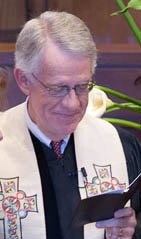From early on, I have felt the need to prepare. I think it’s because of my fear of failure. I don’t do well shooting from the hip! I don’t want to come across as unprepared. That’s one reason I wrote out every one of my sermons in full manuscript, and then took the manuscript with me into the pulpit. It’s a tedious way of doing sermon preparation, but at least I was prepared and, hopefully, my preparation was evident.
I’m not prone to nightmares—never have been. But the closest thing I have had through the years to a nightmare was some situation in which I found myself unprepared. I can’t tell you of the number of dreams I’ve had where I was ready to go into a worship service but I couldn’t find my sermon notes or my Bible. And I couldn’t even remember what my sermon topic was! At other times, I wasn’t dressed appropriately. I would panic as I desperately searched for my Bible or my shoes. The music had begun but I wasn’t ready.
I had such a dream last night. My nurse says that my dreams or anxiety are caused either by my disease or the Methadone I’m taking. In my dream last night I was scheduled to lead a Bible study. I’m not sure of the setting or the group I was to lead. But I’m sure of this: I was not prepared. Or if I was prepared, I couldn’t locate my Bible or my Bible study notes. In addition, I was on the ground with the group huddled around me. I couldn’t move. I was surrounded by sheer misery!
Some of this fear of being unprepared is bleeding over into my impending journey to heaven. How prepared am I for this journey? Have I done enough to merit entrance? What more do I need to do to get ready? What if I get there, thinking that I am prepared, only to discover that I’ve “misplaced my notes”? It may sound funny, but it’s not. It’s a valid question and a reasonable fear.
What I have to remind myself is that there is nothing I can do to merit entrance into heaven. God, through Christ, has done it all for me. In reality, I am not prepared, nor do I deserve a place in heaven. But the price has been paid, entrance is assured. All I have to do is to accept the free gift.
The Bible makes it clear: “Let not your heart be troubled….In my Father’s house are many dwelling places; if it were not so, I would have told you; for I go to prepare a place for you. And if I go and prepare a place for you, I will come again and receive you to Myself; that where I am, there you may be also” (John 14:1-4).
The place has been prepared; the price has been paid. I don’t have to have my “notes” with me. God has taken care of everything.
I can’t tell you how much relief and assurance that brings me. My entrance into heaven doesn’t depend on what I’ve done, how much preparation I’m made. I have accepted Christ and He has made it all possible. Thanks be to God.












